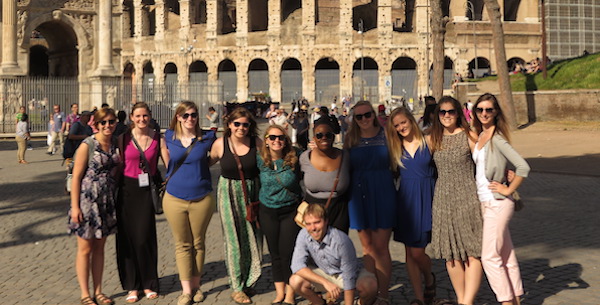
Traveling Abroad to Team Up for United Nations FAO
The ability to work on real-world, global challenges is transformative for students.
“We have a program that can take undergraduate students and develop them into high-functioning teams to work on projects with global impact,” says Joe Colletti, senior associate dean of the College of Agriculture and Life Sciences and associate director of the Agriculture Experiment Station.
For the past 10 years, the Dean’s Global Agriculture and Food Leadership study abroad program has prepared a new team of students to travel to Rome. Each year since 2009, six to 12 students have enrolled in the “Rome program,” been organized into teams and worked on projects for the Food and Agriculture Organization (FAO) of the United Nations. A total of 80 students have participated in the program completing challenging projects with global impact that are implemented by the FAO.
“This is an important program that’s impactful. It’s not a big program with regard to the number of students, but our Iowa State students have made a big contribution,” says Steven Lonergan (’88 animal science, ’91 MS), an animal science professor who has accompanied students on the trip for six of the 10 years.
The idea for the program started when Colletti began thinking of ways to incorporate a capstone study abroad program for agriculture and life sciences students. The program would be designed to give students an opportunity to work for clients as consultants and in high-functioning teams.
Rome was selected because the College of Design had a place for students to stay and Iowa State University had contacts at the FAO. That made it easy for Colletti and Shelley Taylor, director of study abroad for the College of Agriculture and Life Sciences, to approach the FAO.
“It was an opportunity to put something together that was unique and added value for everyone involved,” Colletti says. “It came together perfectly and it’s working very well.”
Taylor says watching students become confident researchers and presenters is fulfilling.
“At the beginning of the class you can see that they doubt they can learn about the research and give a presentation to professionals in Rome,” Taylor says. “By the end of the program they go above and beyond and you can see the confidence they’ve gained.”
Alumni who have gone through the program are pursuing a broad range of professions.
“We have a lot of accomplished alumni in this program,” Taylor says. “One student is working at the White House and contributes to ag trade policy and another is a National Geographic digital storyteller in the bogs of Ireland.”
Celize Christy (’16 animal science and global resource systems) traveled to Rome in 2015 and now works for Practical Farmers of Iowa as the swine and poultry coordinator. She says working with the FAO was the ultimate experience for someone aspiring to work in international development.
“FAO is the mecca for me. It’s similar to someone who wants to work in political science and wanting to be in Washington D.C.,” Christy says. “It’s an amazing place – you meet all these people from all over the world working on large, complex problems.”
The secret to the program’s success is helping students operate as successful teams. To develop those teams, faculty spend a semester preparing students for the trip. Lonergan says students need to know each other’s strengths and weaknesses to succeed.
“High-functioning teams trust each other and challenge each other – once they know each other,” Lonergan says. “Our goal is to make sure they are comfortable and perform as a high-functioning team before they arrive in Rome.”
The Iowa State faculty and FAO staff work together to identify a list of projects for students. The students receive their research projects about halfway through the semester before their trip to Rome. The faculty also provide oversight to ensure the projects are feasible and can be accomplished in the time available.
To give students a break from their consulting work, the program includes a trip to the Tuscany region midway through their month-long visit to Rome. That trip offers students a chance to view the area’s agriculture first-hand and do some taste testing.
“The best meal I ever had was in Tuscany,” says Jake Swanson (’14 global resource systems), the legislative liaison for the Iowa Department of Agriculture and Land Stewardship. “The whole experience was life changing. I learned skills I continue to use.”
The program’s success is evident after every final presentation at the FAO. Taylor says the FAO staff often ask if the students are really undergraduates and if they can get a team to work on their division’s projects.
“I’ve had the personal pleasure of watching the presentations and it’s made me feel proud of our students. The students always hit the ball out of the ball park,” says David Acker, associate dean, academic and global programs and Raymond and Mary Baker Chair in Global Agriculture.
Past projects have ranged from analysis of seed security in India, Brazil and the Ivory Coast, to contributing to a global livestock biodiversity database, to an analysis of bee health in southern Europe.
Colletti says the program’s success is due to the commitment of faculty and staff who prepare students and travel with them to Rome. Alumni who have gone through the program appreciate that commitment.
“We have to thank our advisers and faculty. They made a difference and the resources they provide are working to improve the state of Iowa and the world,” Swanson says.



